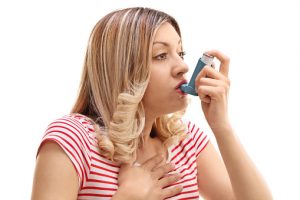
Eczema and hay fever in childhood could develop into allergic asthma in adulthood. The risk of asthma in adulthood was found to be nine times higher among those who suffered from eczema and hay fever as children.
Advertisement
The study looked at nearly 1,400 adult participants of the Tasmanian Longitudinal Health Study (TAHS). Participants were assessed for their childhood allergies at age seven and were followed from 1968 to 2004.
Lead author Pamela Martin said, “In this study, we see that childhood eczema, particularly when hay fever also occurs, is a very strong predictor of who will suffer from allergic asthma in adult life. The implications of this study are that prevention and rigorous treatment of childhood eczema and hay fever may prevent the persistence and development of asthma.”
Principal investigator Shyamali Dharmage added, “If successful strategies to stop the ‘atopic march’ are identified, this could ultimately save lives and healthcare costs related to asthma management and treatment.”
The researchers estimate that nearly 30 percent of asthma cases in adulthood are a result of childhood asthma.
Tips to control your allergic asthma
The treatment for asthma focuses on two strategies. The first is to reduce frequency and severity of attacks. This is done by limiting exposure to triggers and using “rescue” medications to treat sudden flare-ups. The most common of these are the puffs and inhalers. The second strategy is to control the underlying inflammation and constriction of the airways. This is a more long-term strategy and involves the use of inhaled or injected corticosteroids.
Asthma is a long-term disease that has no cure. The goal of asthma treatment is to control the disease. Good asthma control will
- Prevent chronic and troublesome symptoms, such as shortness of breath and coughing
- Reduce your need for quick relief medicines
- Help you maintain good lung function
- Let you maintain your normal activity level and sleep through the night
- Prevent asthma attacks that could result in an emergency room visit or hospital stay
Advertisement
Having a clean home is important, especially if you or someone you love has asthma. Be wary of bringing home pets as their dander can be an asthma trigger, and they can also bring in other triggers from the outdoors. Keep your house as decluttered as possible. Use an air purifier or mechanical air cleaner. Don’t use a humidifier as it can worsen mold and dust. Be mindful of cleaning products that you use as some contain harsh ingredients that can trigger asthma. Allergy-proof your home as best as you can – dust, refrain from keeping windows open during pollen season, use hypoallergenic bedding.
Here are some additional treats to manage your allergic asthma.
- Wash your hands:This ensures you do not spread or contract colds, which can make asthma much worse.
- Keep your mouth closed:Breathing from your nose instead of your mouth will reduce the amount of cold air that can get into your lungs and cause an asthma attack.
- Replace filters:Ensure filters in home-heating devices and air filtrations are clean.
- Exercise indoors: Also remember to warm up before working out.
- Take preventative steps against asthma flare-ups:Take your medication prior to going outside, at least 30 minutes before or as directed by your doctor.
- Have an action plan:Even if you follow these tips, an asthma attack can still occur, so have a plan to recognize the symptoms, have the appropriate medications on hand, and know when to call your doctor or emergency contact.
- Take your medications:Even though you should be following your asthma regimen any time of the year, it is particularly important in the winter to help prevent serious complications.
- Avoid heading outdoors when pollen counts are high
By following these tips and your asthma management plan, you can have greater success in managing your allergic asthma.
